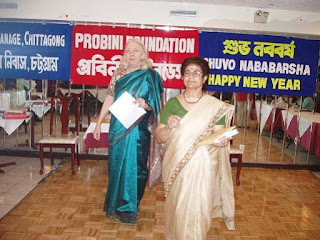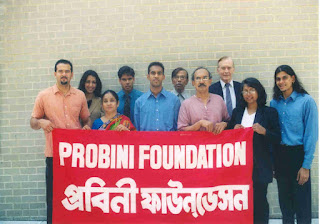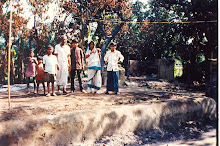Sachi G. Dastidar
Since 1990 Probini Foundation of New York, founded by the Sachi G.
& Shefali S. Dastidar of New York, has been helping the poor and the
orphaned in Bangladesh and in the Indian states of Assam, Mizoram and West Bengal receive
education. Now Probini helps education in over 30 schools and orphanages. Most of
the children receiving help fall into poorest of the poor of Third World
nations — sometimes families earning no more than $25 dollars per month for a family of
three generations of 8 to 10 individuals. Yet those families are hungry for education.
The project started in late 1980s when an old student hostel (dormitory) for 70 boys in Comilla in eastern Bangladesh faced extreme difficulty during the regime of a military dictatorship. At their request Dastidars were able to help them. From 1990 till 2010 there were three attacks on the property damaging the adjacent Hindu Shiva and Kali temples, cremation area, the memorial garden and more. Pro-secular and pro-tolerant people of all persuasions came to help the dorm and its residents.
In early 1990s Dastidar family, their two young kids, and friends started raising money by selling tea at the annual fall Hindu Durga Puja festival in New York. Following the initial success they sold flowers, donated cooked Bengali/Indian/American foods and drink, plus hot tea, of course. Soon they started raising funds by holding luncheon in late April, coinciding with the celebration of Baisakh New Year. It quickly became a popular event in Metro New York area where Probini also honored individuals with Anath Bandhu (Friend of the Orphaned), Samaj Bandhu (Friend of the Community) and Chhatra Bandhu (Friend of the Student) Awards.
Probini (A) provides scholarships to students living in dorms paying their entire cost; (B) pays for teacher's salary; and (C) builds schools and dormitories (hostels) for the poor. Till 2013 they have built the following:
1. Nihar Kana Bhaktabash and Bidyaloi School at Mahilara, Barisal, Bangladesh (completed before incorporation of Probini);
2. Probini Boys' Dormitory at Pranab Ashram, Madaripur City, Bangladesh;
3. Probini Girls' Dormitory at Andharmanik Girls' (Public) High School, Bagerhat, Bangladesh;
5. Probini School Building at Pranab School, SriRamKathi, Pirojpur, Bangladesh;
6. Doihari Sahid Smriti (Martyr's Memorial) Girls' High School Probini Bhaban (Building), Swarupkathi, Bangladesh;
7. Probini Girls' Hostel at Tuthamandra Sarajubala Girls High School, Gopalganj, Bangladesh;
8. Probini Girls' Hostel at Nayan Sadhur (Nayan Monk's) Ashram, Durgapur, Netrokona, Bangladesh;
9. Probini Girls' Hostel at Kadambari Mahabidyaloi (School), Rajoir, Bangladesh;
10. Probini Building at Tuichawng Ultimate Truth Preaching Mission School, Mizoram, India;
11. Probini Hostel (Boys Dormitory), Pranab Ashram, Madaripur;
12. Probini Hostel, Twichawng, Mizoram, India
13. Probini Building at Karasole Shishu Bikash Mandir (Karasole Children's School), Paschim Medinipur, PaschimBanga (West Bengal), India (Under construction)
Once given
education most students finish schools, and have become productive members of
the society. The areas these institutions are located, after Probini’s help,
have come be looked as sources of empowerment for the poor, including minority
and women.
However as intolerant
religious and left extremism have been rising in many of the areas of these institutions. The schools have
come under attack as they provide secular and tolerant education. For
example, one Hindu-run orphanage has been attacked at least three times in the
recent past. While in an area where Probini has built its first school, the headmaster, the teachers and families were driven out before a
national election. In a separate case one orphanage was able to shelter girls,
as young as 8 years, who were gang raped during a pogrom. On the other hand
political extremism has posed problem in another jurisdiction. Nevertheless,
Probini has been able to help groups open new schools and dormitories, provide scholarships
to the orphaned and poor, and provide teachers to schools. With Probini’s presence additional social changes
have taken place as in one village a 300-year old temple was saved while in
another village a centuries-old festival came back to life after being shut
down for fifty years, although Probini did neither fund nor initiate these two projects.
To donate to Probini please go to
www.probini.org
or
www.ispad1947.org (and indicate your donation is for Probini)
Probini is a 501(c)3 (nonprofit) organization and donations
are tax deductible.
First Project: Comilla Boys Orphanage
First Fundraising in 1991 by Selling Tea, Flower and Food In Queens, New York City
Our Probini Committee in Late 1990s (Below)
PROJECTS
First Building Project
Mahilara Mott Nihar Kana Bhaktabash & Bidyaloi School, Bangladesh:
Probini has built the School (on right) and Providing Teachers. Pic: Opening of the Building
Bhumi or Bhit Puja: Laying of Foundation by Poor Resitdents
Karasole Village - of Bengali tribe of Sabar and Lodha tribe - School Students, Faculty, Parents and visitors Drs. Sachi G & Shefali S Dastidar
Tuichawng, Mizoram, School under Construction after Probini's Help
Mizoram School Students, Faculty and guest S G Dastidar

Akondara Santhali Tribal Village School, West Bengal, India:
Probini is Building a Girls' Dormitory
New School Building after Probini Work
New Probini Dorm (Hostel) with 25 Resident Students
Probini Donor's List
Bankura, West Bengal State, India

Purokonda Orphanage of Oppressed-Caste Peoples, West Bengal, India:
Probini is Providing Teachers. It is in Bankura District of West Bengal State in eastern India. It is run by Purbanchal Ananda Foundation, and directed by Arindam Banerjee. In 2021 Purbanchl also ran many other projects, including briddhasram (home for senior citizens), homeless shelter, etc.

AndharManik Girls' High School, Bagerhat, Bangladesh:
Probini has built the Dormitory

Surya Sen Orphanage and School, Uzirpur, Bangladesh:
Probini is rebuilding Tornado-destroyed School and Hostel, and Providing Teachers

Sahid Smriti (Martyrs' Memorial) Girls' High School, Swarupkathi, Bangladesh:
Probini has rebuilt the Tornado-destroyed School and Dormitory
Picture During Construction of Probini Bhaban (Building)
New School - Probini Bhaban - Building

Kasturba Gandhi Memorial Primary School, Nandigram, West Bengal, India:
Probini is Providing Teachers

Dhowa Danga Santhali Tribal Village School, West Bengal, India;
Probini is Providing Teachers

Mahiskapur Slum School, Durgapur, India:
Probini is Providing Teachers

Tilak Road Basti (Slum) School, Durgapur, India:
Probini is Providing Teachers

Madaripur Ashram School Dormitory, Bangladesh:
Probini has rebuilt Religious-terrorist destroyed Dorm

Assam Buddhist Vihar School and Orphanage, India:
Probini is Providing Teachers and Supporting Resident Students

Pranab School Probini Building, SriRamKathi, Bangladesh:
Probini has built the School Building
Calcutta / Kolkata
The Orphanage was started by Aunt Mira Mashi who initially received four Hindu refugee orphan girls after their families were killed in pogroms in East Pakistan in late 1940s and early 1950s, now Bangladesh. Soon she had to find a permanent shelter from her home as number of orphan girls increased significantly. The orphanage shelters girls up to high graduation. It also admits girls from poor families, especially, of families headed by a single mother. This is true for most orphanages in the Subcontinent.

Calcutta Girls' Orphanage, or Shushu Kalyan Kendra, West Bengal, India:
Probini is Providing Scholarship for Resident Students
Hashina: Probini’s First Sponsor at Calcutta Orphanage
Probini is Providing Student
Scholarship
U.S. Consul General Hon. Lee
Alison Sibley & Wife at the Orphanage in southern Calcutta at Probini's Invitation. Dr. Shefali Sengupta Dastidar, Probini Co-Founder of New York is at the Meddle. Orphanage administrators are on the right and back. Little girls are welcoming their honored guests. Mrs. Sibley entertained the students and guests with beautiful Rabindra Sangeet, meaning rendering of songs of poet Rabindranath Tagore.

Monk Nayan's Orphanage Ashram, Netrokona, Bangladesh:
Probini is Providing Teachers, Student Scholarship,
funded Agricultural Self-sufficienncy Projects and Building a New Probini Hostel Dormitory
Monira, a 14-year old girl rescued by monk Nayan Sadhu, center in white dhuti outfit, finds shelter in Sadhu's Probini-built Probini Hostel dorm at Netrokona Orphanage
Finally, Monira Mohanto Found Refuge
Mushfiqur Masood, Netrokona Representative:
September 19, 2017
14-year-old Monira Mohanto. Looking for a shelter
after being homeless. There was no shelter from the relatives. Neighbors
including relatives turned her away. This issue is visible in the media.
According to the information sent by Daily Prothom Alo's Bagmara (Rajshahi)
correspondent Mamunur Rashid, the news was published in the daily Prothom Alo
on September 13 under the headline 'Where will the girl go now'. The issue has
come to the notice of people from different walks of life since the news was
published. Finally, with the help of a human rights organization called
'Minority Watch', teenager Monira Mohant found shelter on Tuesday afternoon (September
19) at the Nityananda Goswami Nayan founded ManabKalyaanKami Anathaloi (Orphanage
for Serving to Serve Humankind) at Netrokona of Durgapur Upazila.
Mr. T. K. Pandey vice president of Minority Watch
brought Monira Mohanto from Naogaon on Tuesday morning, after all the legal
process was completed, to Nityananda Goswami Nayan, the founder of the Human
Welfare Orphanage at Durgapur in Netrokona.
Monira Mohanto said, "Although I did not get shelter from my blood
relatives, I am happy to get shelter in this ashram." This ashram is now
my family. I want to grow up by studying here.
Minority Watch vice president T. K. Pandey said "While
looking for a safe haven for this helpless girl, we found a humanitarian orphanage
in Netrokona's Durgapur upazila". Later, I contacted Nityananda Goswami
Nayan, the founder of the organization, and after all the legal process, I handed
over Monira to him. Minority Watch will act as Monira's guardian until her Monira's
marriage.
Monira, a
14-year-old girl, is the daughter of Swapan Kumar Mohanto of Hulikhali village
in Nardash union of Bagmara upazila of Rajshahi (district). Father Swapan Kumar
Mohanto used to sing kirtan in different areas. Her mother Bulbuli Rani Mohanto
was a housewife. In 2006, Bulbuli Rani Mohanto converted to Islam out of love
and married a local Muslim man. Monira was five years old then. Then in anger father
Swapan Kumar Mohanto disappeared. Didima grandmother Binar (67) had Monira for
some time. Later, Uttam Roy, a businessman from Naogaon, took Monira to his
house. She grew up there. She used to work in Uttam Roy's house. He expressed
his inability to keep Monira in his house as Uttam Roy's business was damaged
recently. He sent her to Monira's house in Hulikhali on the morning of
September 12 with 14,000 takas. Monira went to Hulikhali and started looking
for her parents. That afternoon she went to her mother with information from
the locals. Her mother was living in Laubaria village of Dwippur union of the
upazila (sub-district). There her mother expressed inability to give her
shelter. Later, when Monira wanted to stay in the shelter of her grandmother,
her grandmother also refused to give her shelter. Because she herself was loving
in someone else's house. Then the issue came up in the media.
Article by Musfik Masud from a local daily
অবশেষে আশ্রয় পেলো
মনিরা মোহন্ত
মুশফিক মাসুদ, নেত্রকোনা প্রতিনিধি:
১৪ বছরের কিশোরী মনিরা মহন্ত। নিরাশ্রয় হয়ে
ঘুরেছে আশ্রয়ের আশায়। স্বজনদের কাছেও মিলেনি আশ্রয়। স্বজনসহ প্রতিবেশীরাও তার থেকে মুখ ফিরিয়ে নেয়। এ বিষয়টি গণমাধ্যমের
দৃষ্টিগোচর হয়। দৈনিক প্রথম আলোর বাগমারা (রাজশাহী) প্রতিনিধি মামুনুর রশিদের পাঠানো তথ্যে গত ১৩ সেপ্টেম্বর দৈনিক প্রথম আলো পত্রিকায় ‘মেয়েটি এখন যাবে কোথায়’ শিরোনামে সংবাদ প্রকাশিত হয়। সংবাদটি প্রকাশের পর থেকেই সমাজের বিভিন্ন পর্যায়ের ব্যক্তিদের নজরে আসে বিষয়টি। অবশেষে ‘মাইনোরেটি ওয়াচ’ নামক একটি মানবাধিকার সংগঠনের সহায়তায় নেত্রকোনার দুর্গাপুর উপজেলায় নিত্যানন্দ গোস্বামী নয়নের প্রতিষ্ঠিত মানব কল্যাণকামী অনাথালয়ে মঙ্গলবার(১৯ সেপ্টেম্বর) দুপুরে আশ্রয় মিললো কিশোরী মনিরা মোহন্তের।
মঙ্গলবার সকালে নওগাঁ থেকে মনিরা মোহন্তকে মাইনোরিটি
ওয়াচের সহসভাপতি টি. কে. পাণ্ডে সকল আইনি প্রক্রিয়া শেষে নেত্রকোনার দুর্গাপুরে অবস্থিত মানব কল্যাণকামী অনাথালয়ের প্রতিষ্ঠাতা নিত্যানন্দ গোস্বামী নয়নের কাছে তাকে বুঝিয়ে দেন।
মনিরা মোহন্ত জানায়, আমার রক্ত সম্পর্কীয় আত্মীয়দের কাছে আশ্রয় না
পেলেও এই আশ্রমে আশ্রয় পেয়ে আমি আনন্দিত। এই আশ্রমই
এখন আমার পরিবার। আমি এখানে থেকে পড়াশোনা করে অনেক অনেক বড় হতে চাই।
মাইনোরিটি ওয়াচের সহসভাপতি টি. কে. পাণ্ডে
বলেন, নিরাশ্রয় অসহায় এই মেয়েটির জন্য একটি নিরাপদ আশ্রয় খুঁজতে গিয়ে আমরা নেত্রকোনার দুর্গাপুর উপজেলায় মানব কল্যাণকামী অনাথালয়ের সন্ধান পাই। পরে প্রতিষ্ঠানটির প্রতিষ্ঠাতা নিত্যানন্দ গোস্বামী নয়নের সঙ্গে যোগাযোগ করে সকল আইনি প্রক্রিয়া শেষে মনিরাকে তাঁর কাছে বুঝিয়ে দিই। মনিরার বিবাহের পূর্ব মুহূর্ত পর্যন্ত মাইনোরিটি ওয়াচ মনিরার অভিভাবক হিসেবে দায়-দায়িত্ব পালন করবে।
উল্লেখ্য, ১৪ বছর বয়সের কিশোরী মনিরা রাজশাহীর বাগমারা উপজেলার
নরদাশ ইউনিয়নের হুলিখালী গ্রামের স্বপন কুমার মোহন্তের
মেয়ে। বাবা স্বপন কুমার মোহন্ত বিভিন্ন এলাকায় ঘুরে ঘুরে কীর্তণ গাইতেন। তার মা বুলবুলি রাণী মোহন্ত ছিলেন গৃহিণী। ২০০৮ সালে বুলবুলি রানী মোহন্ত পরকীয়া প্রেমের জের ধরে ধর্মান্তরিত হয়ে এলাকার এক মুসলমান ব্যক্তিকে বিয়ে করেন। তখন মনিরার বয়স ছিল পাঁচ বছর। এরপর ক্ষোভে বাবা স্বপন কুমার মোহন্ত নিরুদ্দেশ হন। দিদিমা (নানি) বিনার (৬৭) কাছে কিছুদিন ছিল মনিরা। পরে উত্তম রায় নামের নওগাঁ শহরের একজন ব্যবসায়ী মনিরাকে তাঁর বাড়িতে নিয়ে যান। সেখানে বেড়ে ওঠে সে। উত্তম রায়ের বাড়িতেই সে কাজ করত। সম্প্রতি উত্তম রায়ের ব্যবসা ক্ষতিগ্রস্ত হওয়ায় তিনি মনিরাকে তার বাড়িতে রাখতে অপারগতা প্রকাশ করেন। তিনি গত ১২ সেপ্টেম্বর সকালে ১৪ হাজার টাকাসহ মনিরার নিজ বাড়ি হুলিখালীতে তাকে পাঠিয়ে দেন। হুলিখালীতে গিয়ে মনিরা তার বাবা-মায়ের খোঁজ শুরু করে। ওই দিন বিকেলে স্থানীয় লোকজনের কাছ থেকে
তথ্য নিয়ে সে মায়ের কাছে যায়। উপজেলার দ্বীপপুর ইউনিয়নের লাউবাড়িয়া গ্রামে তার মা ঘর-সংসার করছেন। সেখানে তার মা তাকে আশ্রয় দিতে অপারগতা প্রকাশ করে। পরে মনিরা তার দিদিমার (নানি) আশ্রয়ে থাকতে চাইলে তার দিদিমাও তাকে আশ্রয় দিতে অস্বীকৃতি জানান। কারণ তিনি নিজেই অন্যের বাড়িতে আশ্রিতা। এরপরই বিষয়টি গণমাধ্যমে উঠে আসে।


RamaKrishna School at Sweeper's Colony, Dinajpur, Bangladesh:
Probini is Providing Teachers

Jagatpur Ashram Orphanage and School, Chittagong, Bangladesh:
Probini is Providing Scholarships for Resident Students

Vivekananda Bani Prachar Samiti-run School, B-Zone, Durgapur, India;
Probini is Providing Teachers

Dhaka Girl's Orphanage, Bangladesh:
Probini is Providing Scholarships to Resident Students

RamaKrishna Mission-run Poor Student Programs, Barisal, Bangladesh;
Probini is Providing Scholarships

Mahilara Mott Nihar Kana Bhaktabash School, Bangladesh:
Probini has built the School (on right) and Providing Teachers
(A Probini member has saved the 300-year Old Temple, on background, from terrorist destruction.)
Bangladesh Government Graciously wrote back to Sachi G. Dastidaar
Promising Repair of the 350-Year Old Shrine
RamaKrishna Boys' Orphanage, Comilla, Bangladesh:
Probini is Providing Scholarships to Needy Resident Students -- Probini's First Project
Gandhi Ashram, Jayag, Noakhali

Gandhi Ashram, Noakhali, Bangladesh:
Probini is Providing Scholarships to Resident Students
Widowed Mrs. Patwory's daughter and son were provided scholarships by Probini for their schooling at Gandhi Ashram, Noakhali
Memorial of seven (Hindu minority) pacifists murdered by Pakistan Army and local Bengali Islamists during 1971 Bangladesh Liberation Struggle
Mothers working at Gandhi Ashram, Noakhali, Bangladesh
For additional Information, check http://www.probini.org/











































